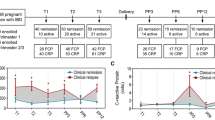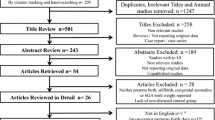Abstract
Background
Malnutrition and weight loss are common features of patients with inflammatory bowel disease (IBD).
Aim
To explore the impact of inadequate gestational weight gain (GWG) on adverse outcomes among IBD mothers in the prospective US pregnancy in Inflammatory Bowel Disease and Neonatal Outcomes (PIANO) cohort.
Methods
The PIANO cohort comprises 559 and 363 pregnant mothers with Crohn’s disease (CD) and ulcerative colitis (UC), respectively, enrolled between 2006 and 2014. The mothers were followed during and after pregnancy to ascertain medication, measurement of disease activity and complications during pregnancy and at delivery. Inadequate GWG was based on US Institute of Medicine recommendations. The associations between inadequate GWG and adverse pregnancy outcomes in maternal IBD were analyzed, adjusted for diabetes, hypertension, smoking, maternal age, education, and disease activity.
Results
Maternal CD and UC with inadequate GWG had a 2.5-fold increased risk of preterm birth (OR 2.5, CI 1.3, 4.9 and OR 2.5, CI 1.2, 5.6). Furthermore, an increased risk of intrauterine growth restriction and a trend for small for gestational age were demonstrated in CD but not in UC (OR 3.3, CI 1.1, 10.0, OR 4.5, CI 0.8, 24.3, p = 0.08). Flares increased risk of inadequate GWG (OR 1.6, CI 1.2, 2.3, p = 0.002) but did not change the associations between inadequate GWG and adverse pregnancy outcomes in our models.
Conclusion
The US PIANO cohort demonstrated that inadequate GWG was a strong independent predictor of adverse pregnancy outcomes in IBD mothers.
Similar content being viewed by others
Abbreviations
- BMI:
-
Body mass index
- CI:
-
Confidence interval
- CD:
-
Crohn’s disease
- GWG:
-
Gestational weight gain
- HBI:
-
Harvey–Bradshaw Index
- IBD:
-
Inflammatory bowel disease
- IOM:
-
The US Institute of Medicine
- IUGR:
-
Intrauterine growth restriction
- OR:
-
Odds ratio
- PIANO:
-
Pregnancy IBD and Neonatal Outcomes
- REE:
-
Resting energy expenditure
- SCAI:
-
Short Colitis Activity Index
- UC:
-
Ulcerative colitis
References
Mahadevan U, Sandborn WJ, Li DK, Hakimian S, Kane S, Corley DA. Pregnancy outcomes in women with inflammatory bowel disease: a large community-based study from Northern California. Gastroenterology. 2007;133:1106–1112.
Bush MC, Patel S, Lapinski RH, Stone JL. Perinatal outcomes in inflammatory bowel disease. J Matern Fetal Neonatal Med. 2004;15:237–241.
Morales M, Berney T, Jenny A, Morel P, Extermann P. Crohn’s disease as a risk factor for the outcome of pregnancy. Hepato-gastroenterology. 2000;47:1595–1598.
Bengtson MB, Solberg IC, Aamodt G, Jahnsen J, Moum B, Vatn MH. Relationships between inflammatory bowel disease and perinatal factors: both maternal and paternal disease are related to preterm birth of offspring. Inflamm Bowel Dis. 2010;16:847–855.
Stephansson O, Larsson H, Pedersen L, et al. Crohn’s disease is a risk factor for preterm birth. Clin Gastroenterol Hepatol. 2010;8:509–515.
Stephansson O, Larsson H, Pedersen L, et al. Congenital abnormalities and other birth outcomes in children born to women with ulcerative colitis in Denmark and Sweden. Inflamm Bowel Dis. 2011;17:795–801.
Dzakpasu S, Fahey J, Kirby RS, et al. Contribution of prepregnancy body mass index and gestational weight gain to adverse neonatal outcomes: population attributable fractions for Canada. BMC Pregnancy Childbirth. 2015;15:21.
Pregnancy Weight Gain During. Reexamining the guidelines. Washington, DC: Natl Acad Sci; 2009.
Oron G, Yogev Y, Shcolnick S, et al. Inflammatory bowel disease: risk factors for adverse pregnancy outcome and the impact of maternal weight gain. J Matern Fetal Neonatal Med. 2012;25:2256–2260.
Raatikainen K, Mustonen J, Pajala MO, Heikkinen M, Heinonen S. The effects of pre- and post-pregnancy inflammatory bowel disease diagnosis on birth outcomes. Aliment Pharmacol Ther. 2011;33:333–339.
Brasil Lopes M, Rocha R, Castro Lyra A, et al. Restriction of dairy products; a reality in inflammatory bowel disease patients. Nutr Hosp. 2014;29:575–581.
Filippi J, Al-Jaouni R, Wiroth JB, Hebuterne X, Schneider SM. Nutritional deficiencies in patients with Crohn’s disease in remission. Inflamm Bowel Dis. 2006;12:185–191.
Sawczenko A, Sandhu BK. Presenting features of inflammatory bowel disease in Great Britain and Ireland. Arch Dis Childhood. 2003;88:995–1000.
Moser MA, Okun NB, Mayes DC, Bailey RJ. Crohn’s disease, pregnancy, and birth weight. Am J Gastroenterol. 2000;95:1021–1026.
Norgard B, Fonager K, Sorensen HT, Olsen J. Birth outcomes of women with ulcerative colitis: a nationwide Danish cohort study. Am J Gastroenterol. 2000;95:3165–3170.
Molnar T, Farkas K, Nagy F, et al. Pregnancy outcome in patients with inflammatory bowel disease according to the activity of the disease and the medical treatment: a case-control study. Scand J Gastroenterol. 2010;45:1302–1306.
Razack R, Seidner DL. Nutrition in inflammatory bowel disease. Curr Opin Gastroenterol. 2007;23:400–405.
Valentini L, Schaper L, Buning C, et al. Malnutrition and impaired muscle strength in patients with Crohn’s disease and ulcerative colitis in remission. Nutrition (Burbank, Los Angeles County, Calif). 2008;24:694–702.
Moore VM, Davies MJ, Willson KJ, Worsley A, Robinson JS. Dietary composition of pregnant women is related to size of the baby at birth. J Nutr. 2004;134:1820–1826.
Rao S, Yajnik CS, Kanade A, et al. Intake of micronutrient-rich foods in rural Indian mothers is associated with the size of their babies at birth: Pune Maternal Nutrition Study. J Nutr. 2001;131:1217–1224.
Scholl TO. Iron status during pregnancy: setting the stage for mother and infant. Am J Clin Nutr. 2005;81:1218S–1222S.
Sousa Guerreiro C, Cravo M, Costa AR, et al. A comprehensive approach to evaluate nutritional status in Crohn’s patients in the era of biologic therapy: a case-control study. Am J Gastroenterol. 2007;102:2551–2556.
Bager P, Befrits R, Wikman O, et al. The prevalence of anemia and iron deficiency in IBD outpatients in Scandinavia. Scand J Gastroenterol. 2011;46:304–309.
Takaoka A, Sasaki M, Kurihara M, et al. Comparison of energy metabolism and nutritional status of hospitalized patients with Crohn’s disease and those with ulcerative colitis. J Clin Biochem Nutr. 2015;56:208–214.
Shields M, Gorber SC, Tremblay MS. Effects of measurement on obesity and morbidity. Health Rep. 2008;19:77–84.
Fattah C, Farah N, Barry SC, O’Connor N, Stuart B, Turner MJ. Maternal weight and body composition in the first trimester of pregnancy. Acta Obstet Gynecol Scand. 2010;89:952–955.
Funding
This work was supported by the South-Eastern Norway Regional Health Authority.
Author’s contribution
The concept and design was worked out by MBB, UM, and MHV. Analysis and interpretation of data were carried out by CFM and GAA. MBB wrote the paper. All authors contributed to the drafting and editing of the manuscript. All authors have read and approved the manuscript for publication.
Author information
Authors and Affiliations
Corresponding author
Ethics declarations
Conflict of interest
May-Bente Bengtson, Christopher F. Martin and Geir Aamodt do not have any financial or other relationship(s) to disclose. Morten H Vatn: Advisory Board: Genetic Analysis. Uma Mahadevan: Advisory Board: Janssen. Consultant: AbbVie, Genetech, Janssen, Takeda, UCB. Research Grant: Prometheus, UCB.
Rights and permissions
About this article
Cite this article
Bengtson, MB., Martin, C.F., Aamodt, G. et al. Inadequate Gestational Weight Gain Predicts Adverse Pregnancy Outcomes in Mothers with Inflammatory Bowel Disease: Results from a Prospective US Pregnancy Cohort. Dig Dis Sci 62, 2063–2069 (2017). https://doi.org/10.1007/s10620-017-4547-5
Received:
Accepted:
Published:
Issue Date:
DOI: https://doi.org/10.1007/s10620-017-4547-5




